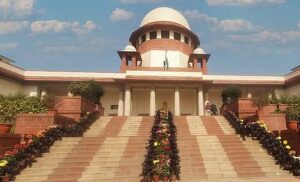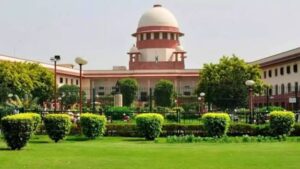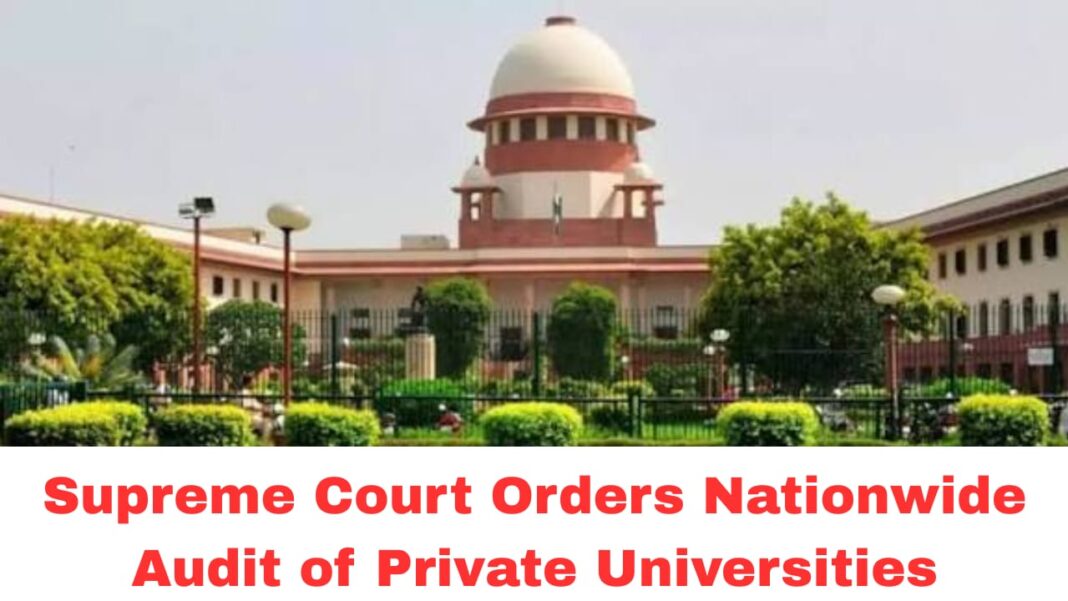Digital News Guru National Desk:
Why the Supreme Court has turned eyes on private universities
India’s highest court expanded a relatively narrow grievance into a sweeping inquiry into the governance, finances, and administrative transparency of private, non-government, and deemed universities across the country.
The trigger: a student — Ayesha Jain (formerly Khushi Jain) — filed a petition against Amity University, Noida, alleging that after she legally changed her name, the university refused to update her official records. According to her, she was denied attendance and access to classes, which resulted in a loss of academic year.
What started as a dispute over one student’s name change raised deeper questions in court about how private universities are created, regulated, managed — and whether their operations match the “no-profit, no-loss” model many claim. The SC’s response: a nationwide audit.

What the SC has asked for — the audit mandate
Under the new order:
- The central government, all state governments and union territories, along with the University Grants Commission (UGC), have been directed to submit personally signed affidavits. These affidavits must detail how every private, non-government and deemed university was established — under what statutory provision; who granted sanction; what land or financial benefits (if any) were given; and under what conditions.
- The governance structure of each university must be disclosed: which societies/trusts run them; who are the office bearers; how are their decision-making bodies constituted; how are top posts filled.
- The daily operational aspects will come under scrutiny too: admission procedures, faculty hiring protocols, compliance and oversight mechanisms, grievance redressal systems for students and staff.
- Importantly, the Court has demanded verification of financial claims — especially the often-used “no-profit, no-loss” model. It wants full disclosure of where fees go: whether expenses remain within academic/educational purposes or divert into personal gains, perks, unrelated assets, or inflated salaries.
- The affidavit from UGC must include not only what the regulation stipulates but also how UGC enforces rules in practice: the actual oversight, compliance checks, and action in cases of violations. The SC has insisted the UGC Chairman sign the affidavit personally (no delegation) to ensure accountability.
The Court has warned that any misrepresentation or withholding of facts will be viewed strictly, indicating that this audit is not mere formality but a serious test of institutional transparency.
What triggered this — a singular case, systemic questions
The case of Ayesha Jain may seem personal — but the SC’s decision suggests it reflects systemic problems. The fact that a student’s name change, legally documented, could lead to academic exclusion exposed administrative arbitrariness, lack of transparent record-keeping, and possibly discriminatory practices.
However, rather than limiting itself to that single institution, the Court recognised the broader implications. It held that the issues highlighted in the petition pertain to governance, regulation, and administration of private higher-education institutions — problems that potentially affect thousands of students across the country.
In doing so, SC has effectively converted an individual grievance into a public interest inquiry — underlining the notion that private status does not exempt educational institutions from accountability.

Wider significance: accountability, transparency — and public trust
This nationwide audit holds the potential to reshape how private higher education operates in India. For decades, private and deemed universities have operated under a cloud of privatization-autonomy rhetoric — with limited transparency. The phrase “no profit, no loss” has often been accepted without scrutiny. Now, that claim will have to stand up to rigorous examination backed by sworn declarations.
For students, parents, and society, the audit could bring clarity: who owns and runs these institutions, how decisions are made, how funds are used, whether regulatory oversight is real or mere paperwork. If followed by concrete reforms, this could increase public trust in private universities — or expose misuse, prompting corrective action.
Moreover, the order sends a strong message: educational institutions, whether public or private, are not beyond scrutiny. Regulatory bodies such as UGC must enforce norms in letter and spirit — and institutions must be transparent about governance, finance and administration.
What happens next — timeline and expectations
The SC has asked for affidavits and disclosures at the earliest. Governments and UGC must collate and file detailed dossiers for all private, non-government and deemed universities. The information will cover founding documents, grants, governance structures, land allotments, fee/fund flows, institutional constitutions, and compliance history.
Once affidavits are submitted, the Court is likely to examine them in upcoming hearings (reportedly next hearing scheduled for 8 January 2026).
Depending on findings, the SC may issue further directions: stricter regulatory oversight, penalties for non-compliant universities, reforms in fee and funding transparency, public disclosure of governing authorities, and enforcement of governance standards.
If implemented properly, this could mark the beginning of a new chapter — where private higher education in India becomes more transparent, regulated, and accountable.

Challenges & What to Watch Out For
While the SC’s mandate is robust on paper, practical implementation may face hurdles.
- Gathering foundational documents and records for dozens (hundreds) of universities across many states — many decades old — may be cumbersome.
- Some universities may resist transparency, citing confidentiality or proprietary concerns.
- Disclosure of finances and internal governance may draw backlash from influential private trusts/organizations running institutions.
- Even if affidavits are filed, enforcement — follow-up audits, in-person inspections, compliance checks — will require sustained vigilance from regulators and civil society.
Therefore, public interest groups, student organizations, and media may need to play a watchdog role.
Why This Matters for Students and the Future of Higher Education
For students — past, present, and prospective — this order offers hope. It acknowledges that education is not a commercial transaction but a public good that deserves transparency and regulation.
It could make colleges more accountable: from fair admission processes, proper faculty recruitment, grievance redressal mechanisms, to transparent fee and cost structures. For parents and employers, greater transparency could increase credibility of degrees and institutions.
For the higher-education ecosystem, this may become a turning point: a push toward regulatory clarity, ethical governance, public accountability, and an end to opaque practices.
Conclusion
The Supreme Court’s decision to order a nationwide audit of private universities over governance and transparency isn’t just about one student’s grievance. It is a bold move that challenges long-standing opacity in private higher education. By demanding full disclosure — legal basis, governance structure, financial flows, compliance mechanisms — the Court has raised the bar for institutional accountability.
What unfolds in the coming months will matter not just for private universities, but for the broader credibility of higher education in India. If institutions comply, and regulators enforce effectively, this could mark the beginning of a more transparent, responsible, and student-centred higher-education sector. If not, the mandate may remain symbolic. Either way, the spotlight is now on private universities — and transparency cannot hide any longer.
You May Also Read: Constitution Day India 2025: 76th Anniversary Celebrated at Central Hall








